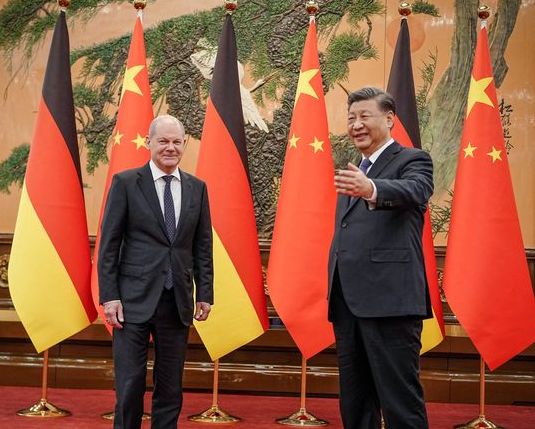China asked Germany to see its development “rationally, comprehensively and objectively,” after Europe’s largest economy released its long-awaited China strategy paper.
The 64-page document, published on Thursday, was unflinching in its appraisal of Beijing’s increasing assertiveness and “unfair practices”.
It also said the Olaf Scholz-led government would review its export control lists against the backdrop of new technological developments to ensure German goods did not “encourage systematic human rights violations in China” or support further military rearmament.
Also on AF: Beijing to Host World’s Biggest Investors for Rare Meeting
The strategy also backed the idea of potentially screening outbound investment controls on cutting-edge technology with military use – an idea the EU Commission is pursuing.
The document comes amid a broader push in the West to reduce strategic dependence on China – which policymakers have labelled “de-risking”.
“Forcibly ‘de-risking’ based on ideological prejudice and competition anxiety will only be counterproductive and artificially intensify risks,” the Chinese embassy in Berlin said in a statement.
Stating that China is a partner for Germany in dealing with challenges, the embassy added that it does not correspond to objective facts or in the common interests of both nations to see China as a “competitor and institutional rival.”
It highlighted free trade and climate change as areas in which China and Germany hold common interest.
“Pragmatic cooperation between China and Germany in various fields such as economy and trade is mutually beneficial and complementary, and represents greater development opportunities rather than risks for both sides,” said the embassy.
‘China wants to create economic dependencies’
“China has changed. As a result of this and China’s political decisions, we need to change our approach to China,” said Germany’s document, which was approved by the cabinet on Thursday after months of wrangling within Chancellor Olaf Scholz’s three-way coalition.
China remained an indispensable partner to tackle global challenges such as climate change and pandemics, it said. However rivalry and competition had increased in recent years as the role of the Communist Party had expanded under President Xi Jinping.
China was increasingly assertive in its attempts to change the rules-based international order with consequences for global security, it said, even as civil and political rights regressed at home.
“China is seeking to create economic and technological dependencies with a view to using these to assert political objectives and interests,” the strategy said.
The strategy urged companies to take geopolitical risks into account in their decision making “so that state funds do not have to be tapped into in the event of a geopolitical crisis”.
It said it would hold confidential talks with companies particularly exposed to China about their risk analyses.
Germany was reviewing whether state measures like export guarantees were reinforcing excessive dependencies and consulting whether it should develop more instruments to help reduce risks, it said.
It did not however mention possible measures like company stress tests, included in an earlier China strategy draft by the foreign ministry which is run by the Greens who are more hawkish on China than Scholz’s Social Democrats (SPD).
Taiwan, Russia tensions
“We cannot be indifferent on the tension surrounding Taiwan,” German Foreign Minister Annalena Baerbock said at an event to present the paper, which urges an expansion in relations with the island. “A military escalation would also be a danger to millions of people, worldwide, meaning also for us.”
The strategy paper said Germany would continue to strengthen its military presence and cooperation with partners in the Indo-Pacific.
The status quo of the Taiwan Strait may only be changed by peaceful means and mutual consent, it said.
China claims self-ruled Taiwan as its own and has never renounced the use of force to bring it under its control. Taiwan says only the island’s people can decide their future.
The Chinese embassy statement, in response, reiterated Beijing’s opposition to “meddling of its internal affairs” by using issues including Taiwan, Xinjiang, Hong Kong and human rights.
“China will resolutely safeguard its sovereignty, security and development interests,” it said.
Narrow government role
At now nearly 300 billion euros ($325 billion) in imports and exports, China is a core market for top German companies including Volkswagen, BASF and BMW.
Germany has, thus, at times been seen as a weak link in the Western approach to China, which became the country’s single biggest trade partner in 2016.
Even so, German companies and industry associations – some of which had warned against moving away from China too abruptly – widely welcomed the strategy that did not lay out any binding targets or requirements.
“Berlin is speaking loudly but it is wielding a small stick. Chancellor Scholz has made clear that he sees a very narrow role for the government when it comes to de-risking,” said Noah Barkin, Europe-China expert at Rhodium Group, a US-based research firm.
Vague on China policy
Juergen Matthes, of the German Economic Institute, IW, said the concept of de-risking was also still too vague.
“We need a clear identification of really critical dependencies and the government should regularly monitor whether de-risking on this basis is actually advancing,” he said.
Other analysts said the strategy, which markedly underscored throughout the need for close cooperation with the European Union on China, sent a clear message that Germany’s approach to the country had changed, after years of prioritising bilateral economic interests.
“It‘s positive that it offers a largely unvarnished take on the challenges posed by the party state,“ Thorsten Benner of the Global Public Policy Institute, said.
“It’s a much-needed first class funeral for (former Chancellor Angela) Merkel’s delusions of a comprehensive strategic partnership with Xi’s China.”
- Reuters, with additional editing by Vishakha Saxena
Also read:
China Chip Metal Curbs See Germany Urge Faster ‘De-Risking’
China’s Economic Aggression a Global Threat, says Germany
China Becoming More Rival Than Partner: Germany’s Baerbock
China Decoupling Will Cost Jobs: Germany Finance Minister
Germany Blocks Chip Firm Sale Due to Security Concerns
























